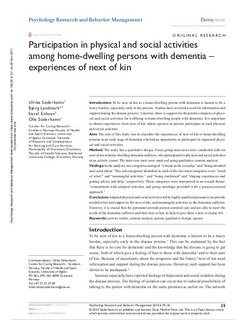| dc.contributor.author | Söderhamn, Ulrika | |
| dc.contributor.author | Landmark, Bjørg Th. | |
| dc.contributor.author | Eriksen, Sissel | |
| dc.contributor.author | Söderhamn, Olle | |
| dc.date.accessioned | 2017-12-21T12:28:20Z | |
| dc.date.available | 2017-12-21T12:28:20Z | |
| dc.date.created | 2013-06-26T12:58:01Z | |
| dc.date.issued | 2013 | |
| dc.identifier.citation | Psychology Research and Behavior Management. 2013, 6, 29-36. | nb_NO |
| dc.identifier.issn | 1179-1578 | |
| dc.identifier.uri | http://hdl.handle.net/11250/2473522 | |
| dc.description.abstract | Introduction: To be next of kin to a home-dwelling person with dementia is known to be a heavy burden, especially early in the process. Studies have revealed a need for information and support during the disease process. Likewise, there is support for the positive impacts of physical and social activities for wellbeing in home-dwelling people with dementia. It is important to obtain experiences from next of kin whose spouses or parents participate in such physical and social activities. Aim: The aim of this study was to elucidate experiences of next of kin to home-dwelling persons in an early stage of dementia who had an opportunity to participate in organized physical and social activities. Method: The study has a qualitative design. Focus group interviews were conducted with ten next of kin to home-dwelling dementia sufferers, who participated in physical and social activities in an activity center. The interview texts were analyzed using qualitative content analysis. Findings: In the analysis, two categories emerged: “a break in the everyday” and “being attended and cared about.” Two sub-categories identified in each of the two main categories were: “need of relief” and “meaningful activities;” and “being confirmed” and “sharing experiences and getting advice and help,” respectively. These categories were interpreted in an overall theme: “contentment with adapted activities and group meetings provided with a person-centered approach.” Conclusion: Adapted physical and social activities led by highly qualified personnel can provide a needed relief and support to the next of kin and meaningful activities to the dementia sufferers. However, it is crucial that the personnel provide person-centered care and are able to meet the needs of the dementia sufferers and their next of kin, to help to give them a new everyday life. Key words: activity center, content analysis, parent, qualitative design, spouse | nb_NO |
| dc.language.iso | eng | nb_NO |
| dc.rights | Navngivelse-Ikkekommersiell 3.0 Internasjonal | * |
| dc.rights.uri | http://creativecommons.org/licenses/by-nc/4.0/deed.no | * |
| dc.title | Participation in physical and social activities among home-dwelling persons with dementia - experiences of next of kin | nb_NO |
| dc.type | Journal article | nb_NO |
| dc.type | Peer reviewed | nb_NO |
| dc.description.version | publishedVersion | nb_NO |
| dc.source.pagenumber | 29-36 | nb_NO |
| dc.source.volume | 6 | nb_NO |
| dc.source.journal | Psychology Research and Behavior Management | nb_NO |
| dc.identifier.doi | 10.2147/PRBM.S46334 | |
| dc.identifier.cristin | 1036561 | |
| cristin.unitcode | 222,56,1,0 | |
| cristin.unitname | Institutt for sykepleie- og helsevitenskap | |
| cristin.ispublished | true | |
| cristin.fulltext | original | |
| cristin.qualitycode | 1 | |

